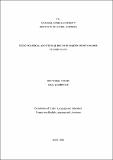Please use this identifier to cite or link to this item:
http://hdl.handle.net/11547/1974| Title: | SOCIO-POLITICAL AND ETHICAL ISSUES IN MARTIN CRIMP’S MAJOR STAGED PLAYS |
| Authors: | Şakiroğlu, Belgin |
| Keywords: | Marin Crimp Contemporary British Drama Cultural Materialism Socialist Feminism Artaudian Theatre Martin Crimp Çağdaş İngiliz Tiyatrosu Kültürel Materyalizm Sosyalist Feminizm Artaud’un Tiyatrosu |
| Issue Date: | 2015 |
| Publisher: | ISTANBUL AYDIN UNIVERSITY INSTITUTE OF SOCIAL SCIENCES |
| Abstract: | Theatre started to transform from the political aesthetics of the 1970s and the 1980s to the avant-garde aesthetic of the 1990s. After a long break, since the British theatre of the 1990s witnessed a new theatre movement, called In-Yer-Face by Alex Sierz, which critiques traditional British Theatre with its cruel language and challenging plots. Martin Crimp has produced his most well-known plays in this aesthetic. To show Crimp’s contribution to the British theatre from a wider perspective, this thesis explores Crimp’s eight staged plays, Definitely The Bahamas (1987), Dealing with Clair (1988), The Treatment (1993), Attempts on Her Life (1997), The Country (2000), Cruel and Tender (2004), Fewer Emergencies (2005), and The City (2008), basing its discussion on different critical theories, Cultural Materialism, Socialist Feminism, and Artaud’s theory. For that reason, different criticisms are applied to his plays in the light of these three theories. In the Introduction, Crimp’s life and the In-Yer-Face movement will be scrutinized. In the first chapter, the theories, Cultural Materialism, Socialist Feminism, and Artaudian Theatre, are explained in a detailed way to correlate between the plays and the theories. The aim of the second chapter is to find the analogy between Artaud’s theatre, Crimp’s theatre, and Crimp’s usage of Artaudian cruelty in his contemporary plays. This is why his three plays, Fewer Emergiencies, Definitely the Bahamas, and The Country were chosen according to their main theme, cruelty. Drawing on Cultural Materialism, the third chapter reveals how Crimp reflects the political and cultural factors of his period into his plays, The City and Dealing with Clair, and how he approaches these factors in his plays. In the fourth chapter, women characters in his plays, The Treatment, Attempts on Her Life, and Cruel and Tender, are analyzed to illustrate how Crimp integrates the perception of women body in the contemporary world into his plays. In the conclusion part, it is pointed out how Crimp reflects the cruelness in this world dramatically using stage devices to reach the audiences’ unconscious like Artaud. Secondly, Crimp’s pessimistic attitude towards the power of ideology and its negative effect on individuals are clarified. The disappearance of the characters in his plays indicates how individuals are victimized in a system. Lastly, after examining female characters in his plays, it is found out that his female characters are imprisoned in the domestic sphere and they fail to struggle with both capitalism and patriarchy. |
| URI: | http://hdl.handle.net/11547/1974 |
| Appears in Collections: | Tezler -- Thesis |
Files in This Item:
| File | Description | Size | Format | |
|---|---|---|---|---|
| 426111.pdf | 1.54 MB | Adobe PDF |  View/Open |
Items in DSpace are protected by copyright, with all rights reserved, unless otherwise indicated.
